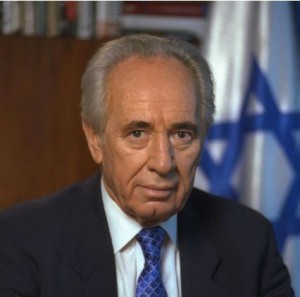 At a joint press conference with European Commission President Jose Manuel Barroso in Brussels, Shimon Peres also says�Iran at center of human rights violations and international terrorism.
At a joint press conference with European Commission President Jose Manuel Barroso in Brussels, Shimon Peres also says�Iran at center of human rights violations and international terrorism.Western sanctions aimed at convincing�Iran�to give up its nuclear program were having an effect, but were not yet enough, Israeli President Shimon Peres said Thursday.
"My own impression is that the sanctions did more than was expected, but not yet enough to achieve the goal," Peres said at a joint press conference with European Commission President Jose Manuel Barroso in Brussels.
Peres also referred to U.S. warnings that "other options," besides political and economic forms of pressure, were on the table.
He said Iran not only risked becoming a nuclear threat, but was also at the center of human rights violations and international terrorism.
Iran supports the Lebanese Shiite movement Hezbollah, which was recently implicated in a deadly attack on Israeli tourists in Bulgaria last year.
"All this should be stopped, preferably economically and politically but without any compromise. The goal must be achieved," the Israeli president said.
EU foreign ministers may consider imposing further sanctions on Iran over its human rights record at talks on Monday, according to diplomats.
Peres was on a multi-day visit to Brussels, which included talks Thursday with NATO Secretary General Anders Fogh Rasmussen and meetings with other EU leaders.
The United States warned Iran on Wednesday that it faces further international isolation and pressure if it fails to address United Nations nuclear watchdog concerns about its atomic activity, which the West fears has a military purpose.
In a hard-hitting statement delivered at a board meeting of the UN International Atomic Energy Agency, U.S. envoy Joseph Macmanus accused Iran of "provocative actions", singling out the recent installation of advanced uranium enrichment centrifuges.
At a meeting later on that day, Macmanus stormed out in protest when Iran's representative accused Israel of "genocide," diplomats said.
Officials from Canada and Australia also left the closed-door meeting of the IAEA 5-nation governing board when Iran's Ali Asghar Soltanieh made his statement during a debate on Syria, they said.
The European Union also used the meeting to call on Iran to stop obstructing an IAEA investigation and give the agency access to sites and documents, regardless of broader talks between Iran and world powers that resumed last week.
By Haaretz
The Iran Project is not responsible for the content of quoted articles.










